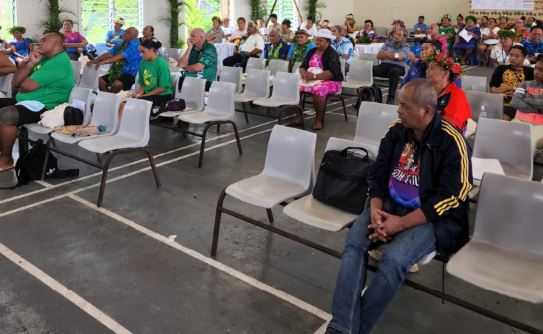What’s the cost to our oceans?
Saturday 28 January 2023 | Written by Te Ipukarea Society | Published in Environment, National

Pa Enua members from the Catholic Synod Forum held earlier this month in Rarotonga. 23012712
Te Ipukarea Society shares environmental issues in the Cook Islands with the Catholic Synod Forum.
Two weeks ago, Te Ipukarea Society was honoured to be asked to present to the Catholic Synod Forum session, entitled Care of the Environment. We were asked to talk about a whole range of environmental work we are involved in.
This was to give the forum a fuller picture of the extent of environmental issues facing Cook Islands and the strain our environment is experiencing. Around 120 people were registered for the forum, held at the Catholic Church Hall in Avarua on January 10.
As it was a long session, we used a tag team approach. Our sustainable tourism intern, Itirangi Pennycook spoke on some of the issues that come with an economy heavily reliant on tourism.
New director Alanna Smith talked about our rat eradication work on Suwarrow Atoll, and her recent trip to Palmerston to look into eradicating rats there, working with the National Environment Service, Ministry of Agriculture and New Zealand Department of Conservation.
Terena Koteka-Wiki spoke about waste management and ocean pollution, in particular plastics pollution.
Kelvin Passfield presented on the geo-textile sand-bag wall at Avana designed to prevent coastal erosion from high water inundation due to storms and climate change. He also presented on the risks associated with deep seabed mining.
Of all these topics, the deep sea mining presentation generated considerable interest among the participants.
Our talk included some information on the growing number of countries who are coming out in support of a ban or moratorium on deep sea mining.
These include New Zealand, France, Spain, Costa Rica, Chile, Ecuador, Panama, Fiji, Federated states of Micronesia, Palau, Samoa, and French Polynesia.
There may now be others.
We received a comment from the floor that the only reason these countries are against deep sea mining, may be because they don’t have the minerals in their waters, the way Cook Islands does. While there may be a small element of truth in that statement, for some of the dissenting countries, it is, but there definitely is not for others.
For example, the waters of our near neighbour, French Polynesia, do have considerable deep sea mineral wealth, some of it in much shallower depths than our nodules, which lie at about 5000 metres.
Other Pacific Island countries could also have gone down the same route as Tonga, Kiribati, Nauru and the Cook Islands, who have all sponsored mining companies from developed countries to pursue mining in international waters in the Pacific, in the Clarion Clipperton Zone.
So to say these countries are only saying no to mining because they do not have minerals is just not true.
The New Zealand Government has been to court a number of times to stop seabed mining going ahead in New Zealand waters.
They have a very real concern for the impacts of this mining on the environment, which is why they have come out in support of a moratorium in international waters.
The message given to the Catholic Forum was that seabed mining should not go ahead until it can be shown that it will not significantly damage our oceans’ health.
Deep sea biodiversity could be lost.
Endemic species may become extinct even before they have been discovered.
As signatories to the Convention on Biodiversity, we are committed to preserving biodiversity and preventing extinctions.
It is hard to see how we can achieve that while driving huge mining machines over the under explored, fragile seabed ecosystem, creating sediment plumes that could have significant environmental impacts which are not yet sufficiently researched or understood.
We very much look forward to hearing about the resolutions that came out of the Synod Forum in relation to caring for our environment, when they are available.















































Comments
Ipukarea Society on 03/02/2023
Which deep sea mining company or organisation are you associated with Terry? You appear to have a great interest in the Cook Islands deep sea mining space. We would be interested to see a reference for your statement about French Polynesia mineral resources? The crusts in French Polynesia are in much shallower water than our nodules, in 800m to 2500m depth, and therefore much easier to access. The high density nodule fields of the Cook Islands are bordering western French Polynesia, There are abundant nodules in the western part of the French Polynesia EEZ. French Polynesia's call for a moratorium is definitely not because it does not have the resources to mine. See the report by the French Scientific https://books.openedition.org/irdeditions/9590?lang=en for example
Terry Smith on 29/01/2023
Te Ipukarea is not very honest in their story telling. They say that French Polynesia has resources but those are crusts - which will be almost impossible to exploit. They have very few nodules. And New Zealand is extremely hypocritical as they have gotten wealthy exploiting their vast oil and gas resources from the ocean - an exercise that has the potential to do far more harm than picking up nodules because of the potential for oil and gas spills. It's amazing that Te Ipukarea works so hard to deny the people of the Cook Islands the wealth they can create with nodule collecting - instead they push to stop this activity so that miners continue to destroy rainforests and poison people and force children and pregnant women to work in awful mining conditions. What a shame.